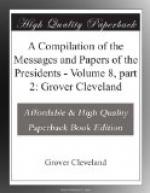The first of these processes is adapted to the arrest of the trespasser upon Indian territories on the spot and in the act of committing the offense; but as it applies the action of the Government of the United States to places where the civil process of the law has no authorized course, it is committed entirely to the functions of the military force to arrest the person of the offender, and after bringing him within the reach of the jurisdiction of the courts there to deliver him into custody for trial. The second makes the violator of the law amenable only after his offense has been consummated, and when he has returned within the civil jurisdiction of the Union. This process, in the first instance, is merely of a civil character, but may in like manner be enforced by calling in, if necessary, the aid of the military force.
Entertaining no doubt that in the present case the resort to either of these modes of process, or to both, was within the discretion of the Executive authority, and penetrated with the duty of maintaining the rights of the Indians as secured both by the treaty and the law, I concluded, after full deliberation, to have recourse on this occasion, in the first instance, only to the civil process. Instructions have accordingly been given by the Secretary of War to the attorney and marshal of the United States in the district of Georgia to commence prosecutions against the surveyors complained of as having violated the law, while orders have at the same time been forwarded to the agent of the United States at once to assure the Indians that their rights founded upon the treaty and the law are recognized by this Government and will be faithfully protected, and earnestly to exhort them, by the forbearance of every act of hostility on their part, to preserve unimpaired that right to protection secured to them by the sacred pledge of the good faith of this nation. Copies of these instructions and orders are herewith transmitted to Congress.
In abstaining at this stage of the proceedings from the application of any military force I have been governed by considerations which will, I trust, meet the concurrence of the Legislature. Among them one of paramount importance has been that these surveys have been attempted, and partly effected, under color of legal authority from the State of Georgia; that the surveyors are, therefore, not to be viewed in the light of individual and solitary transgressors, but as the agents of a sovereign State, acting in obedience to authority which they believed to be binding upon them. Intimations had been given that should they meet with interruption they would at all hazards be sustained by the military force of the State, in which event, if the military force of the Union should have been employed to enforce its violated law, a conflict must have ensued, which would itself have inflicted a wound upon the Union and have presented the aspect of one of these confederated States at war with the




